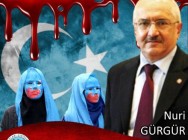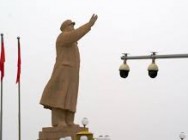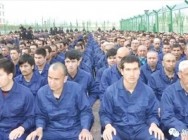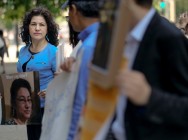Last Minute

- Conflict and Alliance: The US and China: A Centennial Dance: A Century of Relationship from 1900 to 2024
- CHINA RELATIONSEAST TURKESTAN PROBLEM AND TURKEY
- FRONTLINE China Undercover
- Elimination of “Uyghur Counter-Revolutionary Officials” in Academic Fields—Exact Quotes Translated from a Mandarin Audio File
- In Push for Trade Deal, Trump Administration Shelves Sanctions Over China’s Crackdown on Uighurs
- Dalai Lama’s 60th Anniversary Symposium: İlshat Hassan speech in English and Chinese
- Uyghur Detainees from Xinjiang ‘Placed in Nearly Every Prison’ in Shandong Province
- Shahrezad Ghayrat, Unrepresented Women
- Uighur Americans Speak Against China’s Internment Camps. Their Relatives Disappear.
- Rozinisa: The true story of the Uyghur girls in the prison

-

Conflict and Alliance: The US and China: A Centennial Dance: A Century of Relationship from 1900 to 2024
-

CHINA RELATIONSEAST TURKESTAN PROBLEM AND TURKEY
-

FRONTLINE China Undercover
-

Elimination of “Uyghur Counter-Revolutionary Officials” in Academic Fields—Exact Quotes Translated from a Mandarin Audio File
-

In Push for Trade Deal, Trump Administration Shelves Sanctions Over China’s Crackdown on Uighurs
-

Dalai Lama’s 60th Anniversary Symposium: İlshat Hassan speech in English and Chinese
Ilshat Hassan, the Uighur Who Made it to the China Conference on a Tourist Visa
India should be a supporter of the Uighur cause, says the activist, if only for strategic reasons. “By raising support, helping us, the Indian government can have leverage (with China).”
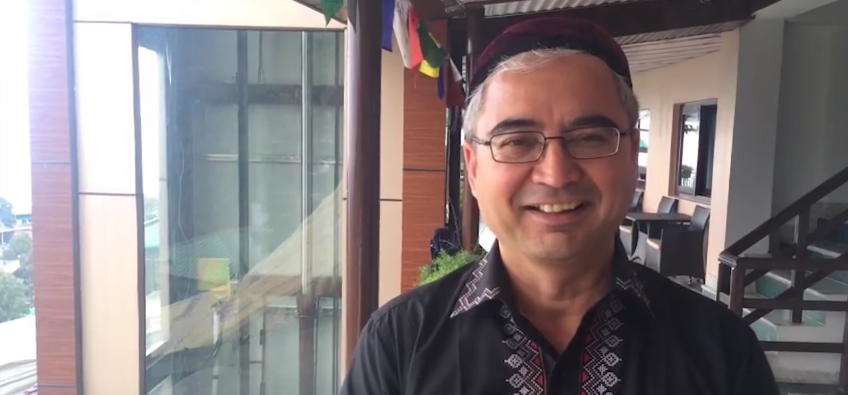
Ilshat Hassan, president of the Uyghur American Association. Credit: Special Arrangement
New Delhi: During the entire duration of his long-haul flight from the United States, Ilshat Hassan was wondering if the immigration authorities at Delhi airport would stop him and put him on the next flight out of India.
President of the Uyghur American Association, Hassan was the only one of the three-member Uighur delegation invited to attend a conference of pro-democracy China dissidents in India who finally managed to reach the venue at McLeod Ganj in Himachal Pradesh. The other Uighur members – Dolkun Isa and Omar Kanat, both from World Uyghur Congress – had their Indian visas cancelled after protests from China.
“Even after I boarded the plane, with my passport, e-visa and ticket. I was really worried. I was expecting to be stopped,” Hassan told The Wire on the phone from McLeod Ganj.
Just like Isa and Kanat, he had also applied for and received a tourist visa to India through the e-visa online application process.
“When I stopped in Abu Dhabi, I had a similar fear. Then I landed in Delhi on April 27. I went through immigration. Things went smoothly. Then I went through customs. My heart was going pow-pow. As I left customs, I was stopped and told to go back. I was the only one at the line, so I thought that this is curious. Why have I been singled out?” Hassan said.
It was because he had submitted an empty customs declaration form. “I hadn’t filled it out. I did that and then walked out. When I was out of the gate, I said, ‘Phew, I am finally here!’,” he recalled.
And why wasn’t he stopped from coming for the conference when he also had a tourist visa? Hassan laughed, “My guess is that I am not an office-bearer of the World Uyghur Congress”.
One of the two reasons given by the Ministry of External Affairs for the cancellation of Dolkun Isa’s visa was that he had “suppressed” the fact in his visa form that he was coming to attend a conference. Similarly, democracy activist Lu Jinghua’s visa was cancelled with the reasoning that there “was inconsistency with the purpose of her visit.”
Just as he left Dharamshala for his return journey to the US, Hassan said that his first trip to India had been “wonderful”. “Nice place, Nice people, Nice hospitality.”
His “big takeaway” was that the Uighur exile community needed to do more networking in India. “I was told how to approach the media, think tanks here in India. We have not been active here recently, which is sad, as our late leader had come straight here (after fleeing form China). I am confident that I will be back.”
And India should be a supporter of the Uighur cause, he felt, if only for strategic reasons. “From my perspective, they (the Indian government) have an obligation to support and provide a platform for voices like ours. By raising support, helping us, the Indian government can have leverage (with China),” Hassan asserted.
Screen Shot 2016-04-29 at 7.46.47 PM
A view of one of the sessions of the China democracy conference at Dharmashala. Credit: Special Arrangement
While an office in India is a likely “long term” plan, there were more immediate, doable proposals. “Maybe, we can approach an Indian think-tank and suggest a seminar on the East Turkestan movement. My new Indian friends have said that they can get more articles published in newspapers,” he added.
All his new contacts are, of course, courtesy his participation at the 11th edition of the Interethnic/Interfaith Leadership Conference organised by the Washington-based Initiatives for China, founded by Tiananmen Square activist Yang Jianli. This year, the event has been co-hosted by the Tibetan Centre for Human rights and Democracy and held in India for the first time.
Till date, there are reports of cancellation or rejection of Indian visas for five activists who were invited to attend the conference. Besides Dolkun Isa, Omar Kanat and Lu Jinghua, the other two are student leaders from Hong Kong.
“The visa cancellation was definitely a topic of discussion (at the conference). People are upset,” said Hassan.
But, just like Hassan, there were several more participants who attended this event with regular tourist visas without any hassle. “There are over 150 people here – including Falun Gong, Taiwanese, Southern Mongolians, Tibetans, Hong Kong activists and some very energetic Chinese youth.”
The fact that other foreign nationals holding tourist visas were able to participate in the well-publicised conference will reinforce the perception that the Modi government blocked the participation of Dolkun Isa and other specific individuals not on the grounds that they had secured an inappropriate visa but because of Chinese pressure.
Asked if there was heightened security due to the controversy, Hassan observed that there was not much visible police personnel. “I didn’t see many policemen. There were some people, who were probably plainclothes”.
The participants also called on the Dalai Lama on April 28 and the ‘prime minister’ of the Tibetan ‘government-in-exile’, Lobsang Sangay on April 29.
Till now, at least in public, the Chinese government has specifically protested only of Dolkun Isa’s visa, citing the fact that there is a red corner notice against him.
The fact that other foreign nationals holding tourist visas were able to participate in the well-publicised conference will reinforce the perception that the Modi government blocked the participation of Dolkun Isa and other specific individuals not on the grounds that they had secured an inappropriate visa but because of Chinese pressure.
After the uproar over the visa cancellation, the organisers had locked down the conference to prevent outside media presence. The only media allowed was Radio Free Asia, which is funded by the US federal agency, the Broadcasting Board of Governors. However, reports, videos and articles emanating from event were only broadcast on its Cantonese service, with the station’s English website not making any reference to the conference or the visa controversy.
Besides RFA, there were social media posts of photos by some of the participants, showing the conference being held on the terrace of the hotel.
The various groups attending the conference at the Norbu house hotel made their own presentations, lasting for about 10 to 20 minutes. Then, there were guest speakers, with Friday’s morning speech delivered by a Harvard University professor. “There were also various sessions with topics like religion, environment and cultural damage,” Hassan added.
During the discussions, there had been a slight disagreement between the young pro-democracy Chinese participants and the ethnic minority representatives.
“The youth from China were arguing that big China should be kept intact, stating that democracy will be coming soon. We didn’t say that we want to be independent, but that we must have self-determination. It will be decided by the people of East Turkestan and the people of Tibet on what they want after they are allowed to decide themselves. I guess they are still young,” he said.
http://thewire.in/2016/05/01/ilshat-hassan-the-uighur-who-made-it-to-the-china-conference-on-a-tourist-visa-32861/
RELATED NEWS







